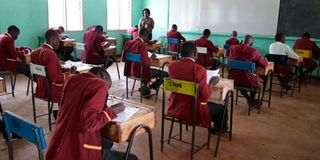New rules to curb cheating as examination season starts

An invigilator supervises English Paper One on the first day of the Kenya Certificate of Secondary Education (KCSE) examination at Kisumu Boys High School on November 4, 2019.
Senior officials from three ministries and agencies that will be involved in the administration of the 2023 national examinations have been invited for a briefing in Nairobi tomorrow morning, marking the start of the examinations season.
County and sub-county education officials, national government administration officials and those from the Ministry of ICT will be briefed on new rules adopted to curb examination irregularities. They will also be given the keys to containers where examination materials are stored.
Expected at the meeting to be held at the Kenya National Examinations Council headquarters at New Mitihani House is Education cabinet secretary Ezekiel Machogu and counterparts Kithure Kindiki (Interior) and Eliud Owalo (ICT).
Teachers Service Commission CEO Nancy Macharia is also expected. National examinations to be administered this year include the Kenya Primary School Education Assessment (KPSEA) for learners in Grade 6, the Kenya Certificate of Primary Education (KCPE) and the Kenya Certificate of Secondary Education (KCSE).
This will be the last KCPE examination since the first one was administered in 1985 and it marks the end of the 8-4-4 system in primary schools. Candidates will do rehearsals on October 27 while the examination will take place from October 30 to November 1.
From next year, learners in primary schools will only be assessed through KPSEA, which combines formative and summative assessment. Learners in Grade 6 will be assessed on the same dates as those who are in Standard 8. This will be the second KPSEA.
The learners will automatically transit to junior school next year and the assessment is not used for placement. KCSE examinations begin on November 6 and end on November 24.
In the new changes, heads of institutions who act as examination centre managers will collect morning examination papers and return the answer sheets to the distribution points and then collect the afternoon papers and return the answer sheets later.
Each of the centres will have two armed security officers.
“We’ve agreed on double collection to address the challenge of early exposure.
To mitigate the challenge of movement, we’ve mapped schools to the closest distribution point instead of the sub-county headquarters,” Knec CEO David Njeng’ere told the Nation.





